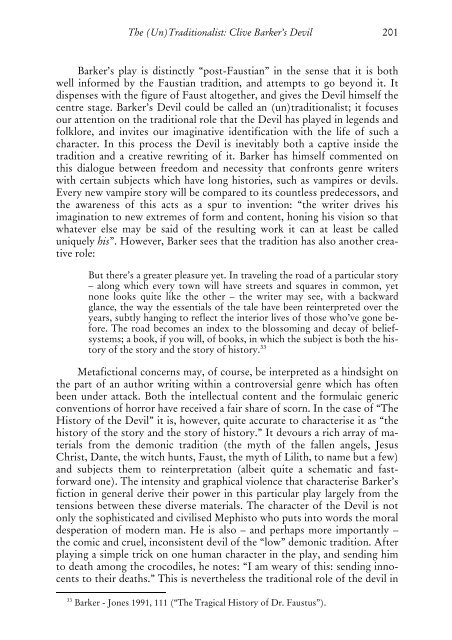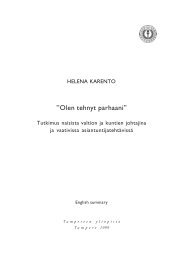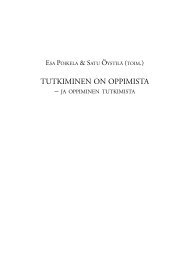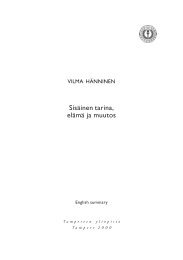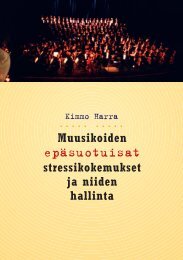Note on this edition: this is an electronic version of the 1999 book ...
Note on this edition: this is an electronic version of the 1999 book ...
Note on this edition: this is an electronic version of the 1999 book ...
Create successful ePaper yourself
Turn your PDF publications into a flip-book with our unique Google optimized e-Paper software.
The (Un)Traditi<strong>on</strong>al<strong>is</strong>t: Clive Barker’s Devil 201Barker’s play <strong>is</strong> d<strong>is</strong>tinctly “post-Fausti<strong>an</strong>” in <strong>the</strong> sense that it <strong>is</strong> bothwell informed by <strong>the</strong> Fausti<strong>an</strong> traditi<strong>on</strong>, <strong>an</strong>d attempts to go bey<strong>on</strong>d it. Itd<strong>is</strong>penses with <strong>the</strong> figure <strong>of</strong> Faust altoge<strong>the</strong>r, <strong>an</strong>d gives <strong>the</strong> Devil himself <strong>the</strong>centre stage. Barker’s Devil could be called <strong>an</strong> (un)traditi<strong>on</strong>al<strong>is</strong>t; it focusesour attenti<strong>on</strong> <strong>on</strong> <strong>the</strong> traditi<strong>on</strong>al role that <strong>the</strong> Devil has played in legends <strong>an</strong>dfolklore, <strong>an</strong>d invites our imaginative identificati<strong>on</strong> with <strong>the</strong> life <strong>of</strong> such acharacter. In <strong>th<strong>is</strong></strong> process <strong>the</strong> Devil <strong>is</strong> inevitably both a captive inside <strong>the</strong>traditi<strong>on</strong> <strong>an</strong>d a creative rewriting <strong>of</strong> it. Barker has himself commented <strong>on</strong><strong>th<strong>is</strong></strong> dialogue between freedom <strong>an</strong>d necessity that c<strong>on</strong>fr<strong>on</strong>ts genre writerswith certain subjects which have l<strong>on</strong>g h<strong>is</strong>tories, such as vampires or devils.Every new vampire story will be compared to its countless predecessors, <strong>an</strong>d<strong>the</strong> awareness <strong>of</strong> <strong>th<strong>is</strong></strong> acts as a spur to inventi<strong>on</strong>: “<strong>the</strong> writer drives h<strong>is</strong>imaginati<strong>on</strong> to new extremes <strong>of</strong> form <strong>an</strong>d c<strong>on</strong>tent, h<strong>on</strong>ing h<strong>is</strong> v<strong>is</strong>i<strong>on</strong> so thatwhatever else may be said <strong>of</strong> <strong>the</strong> resulting work it c<strong>an</strong> at least be calleduniquely h<strong>is</strong>”. However, Barker sees that <strong>the</strong> traditi<strong>on</strong> has also <strong>an</strong>o<strong>the</strong>r creativerole:But <strong>the</strong>re’s a greater pleasure yet. In traveling <strong>the</strong> road <strong>of</strong> a particular story– al<strong>on</strong>g which every town will have streets <strong>an</strong>d squares in comm<strong>on</strong>, yetn<strong>on</strong>e looks quite like <strong>the</strong> o<strong>the</strong>r – <strong>the</strong> writer may see, with a backwardgl<strong>an</strong>ce, <strong>the</strong> way <strong>the</strong> essentials <strong>of</strong> <strong>the</strong> tale have been reinterpreted over <strong>the</strong>years, subtly h<strong>an</strong>ging to reflect <strong>the</strong> interior lives <strong>of</strong> those who’ve g<strong>on</strong>e before.The road becomes <strong>an</strong> index to <strong>the</strong> blossoming <strong>an</strong>d decay <strong>of</strong> beliefsystems;a <strong>book</strong>, if you will, <strong>of</strong> <strong>book</strong>s, in which <strong>the</strong> subject <strong>is</strong> both <strong>the</strong> h<strong>is</strong>tory<strong>of</strong> <strong>the</strong> story <strong>an</strong>d <strong>the</strong> story <strong>of</strong> h<strong>is</strong>tory. 33Metaficti<strong>on</strong>al c<strong>on</strong>cerns may, <strong>of</strong> course, be interpreted as a hindsight <strong>on</strong><strong>the</strong> part <strong>of</strong> <strong>an</strong> author writing within a c<strong>on</strong>troversial genre which has <strong>of</strong>tenbeen under attack. Both <strong>the</strong> intellectual c<strong>on</strong>tent <strong>an</strong>d <strong>the</strong> formulaic genericc<strong>on</strong>venti<strong>on</strong>s <strong>of</strong> horror have received a fair share <strong>of</strong> scorn. In <strong>the</strong> case <strong>of</strong> “TheH<strong>is</strong>tory <strong>of</strong> <strong>the</strong> Devil” it <strong>is</strong>, however, quite accurate to character<strong>is</strong>e it as “<strong>the</strong>h<strong>is</strong>tory <strong>of</strong> <strong>the</strong> story <strong>an</strong>d <strong>the</strong> story <strong>of</strong> h<strong>is</strong>tory.” It devours a rich array <strong>of</strong> materialsfrom <strong>the</strong> dem<strong>on</strong>ic traditi<strong>on</strong> (<strong>the</strong> myth <strong>of</strong> <strong>the</strong> fallen <strong>an</strong>gels, JesusChr<strong>is</strong>t, D<strong>an</strong>te, <strong>the</strong> witch hunts, Faust, <strong>the</strong> myth <strong>of</strong> Lilith, to name but a few)<strong>an</strong>d subjects <strong>the</strong>m to reinterpretati<strong>on</strong> (albeit quite a schematic <strong>an</strong>d fastforward<strong>on</strong>e). The intensity <strong>an</strong>d graphical violence that character<strong>is</strong>e Barker’sficti<strong>on</strong> in general derive <strong>the</strong>ir power in <strong>th<strong>is</strong></strong> particular play largely from <strong>the</strong>tensi<strong>on</strong>s between <strong>the</strong>se diverse materials. The character <strong>of</strong> <strong>the</strong> Devil <strong>is</strong> not<strong>on</strong>ly <strong>the</strong> soph<strong>is</strong>ticated <strong>an</strong>d civil<strong>is</strong>ed Meph<strong>is</strong>to who puts into words <strong>the</strong> moraldesperati<strong>on</strong> <strong>of</strong> modern m<strong>an</strong>. He <strong>is</strong> also – <strong>an</strong>d perhaps more import<strong>an</strong>tly –<strong>the</strong> comic <strong>an</strong>d cruel, inc<strong>on</strong>s<strong>is</strong>tent devil <strong>of</strong> <strong>the</strong> “low” dem<strong>on</strong>ic traditi<strong>on</strong>. Afterplaying a simple trick <strong>on</strong> <strong>on</strong>e hum<strong>an</strong> character in <strong>the</strong> play, <strong>an</strong>d sending himto death am<strong>on</strong>g <strong>the</strong> crocodiles, he notes: “I am weary <strong>of</strong> <strong>th<strong>is</strong></strong>: sending innocentsto <strong>the</strong>ir deaths.” Th<strong>is</strong> <strong>is</strong> never<strong>the</strong>less <strong>the</strong> traditi<strong>on</strong>al role <strong>of</strong> <strong>the</strong> devil in33Barker - J<strong>on</strong>es 1991, 111 (“The Tragical H<strong>is</strong>tory <strong>of</strong> Dr. Faustus”).


